Mayowe Surname Ancestry ResultsOur indexes 1000-1999 include entries for the spelling 'mayowe'. In the period you have requested, we have the following 9 records (displaying 1 to 9): Buy all | | | Get all 9 records to view, to save and print for £44.00 |
These sample scans are from the original record. You will get scans of the full pages or articles where the surname you searched for has been found. Your web browser may prevent the sample windows from opening; in this case please change your browser settings to allow pop-up windows from this site. Grantees of offices, commissions and pardons
(1413-1416)
The Patent Rolls are the Chancery enrolments of royal letters patent. Those for the 1st, 2nd and 3rd years of the reign of king Henry V (21 March 1413 to 20 March 1416) were edited for the Public Record Office by R. C. Fowler, and published in 1910. The main contents are royal commissions and grants; ratifications of ecclesiastical estates; writs of aid to royal servants and purveyors; and pardons. The commissions of the peace issued for the English towns and counties and entered on the rolls, being largely repetitive, have been consolidated in a single appendix.MAYOWE. Cost: £2.00.  | Sample scan, click to enlarge

| The English in France
(1434)
King Henry VI of England (one of the grandsons of Charles VI of France) claimed the throne of France (and quartered the fleurs-de-lis of France with the lions of England on the royal standard) as had his predecessors since Edward III, as descendants of Philip IV of France. The English had real power or influence in Brittany, Normandy, Flanders and Gascony, and actual possession of several coastal garrisons, in particular Calais, where the French inhabitants had been replaced by English. Henry VI came to the throne only seven years after his father had trounced the French at Agincourt; but his cousin, Charles VII, who became king of France in the same year, spent his long reign rebutting the English king's claim to his throne by territorial reconquest and consolidation. The English administration kept a series of records called the French Rolls. On these are recorded royal appointments and commissions in France; letters of protection and safe-conduct to soldiers, merchants, diplomats and pilgrims travelling to France from England and returning, and to foreign legations. There are also licences to merchants to export to the Continent, and to captains to transport pilgrims. As Henry VI's reign progressed, and the English grip on northern France loosened, the French Rolls also increasingly include entries concerning the ransoming of English prisoners.MAYOWE. Cost: £6.00.  | Sample scan, click to enlarge
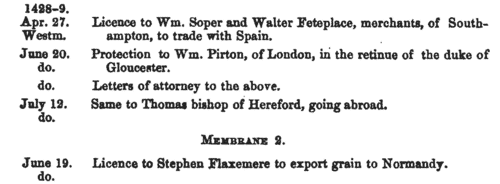
| Close Rolls
(1429-1435)
The close rolls of the 8th to 13th years of the reign of king Henry VI record the main artery of government administration in England, the orders sent out day by day to individual officers, especially sheriffs of shires: they are an exceptionally rich source for so early a period. There is also some material relating to Wales, Scotland, Ireland and the English possessions in France. Also included is the Exchange Roll of 1424 to 1434, of licences to transmit sums of money out of the realm.MAYOWE. Cost: £4.00.  | Sample scan, click to enlarge

| Close Rolls
(1441-1447)
The close rolls of the 20th to 25th years of the reign of king Henry VI record the main artery of government administration in England, the orders sent out day by day to individual officers, especially sheriffs of shires: they are an exceptionally rich source for so early a period. There is also some material relating to Wales, Scotland, Ireland and the English possessions in France. MAYOWE. Cost: £4.00.  | Sample scan, click to enlarge

| Common Pleas: London
(1558)
Pleas at Westminster Michaelmas term, 5 & 6 Philip & Mary and 1 Elizabeth, 1558. The court dealt with civil cases: debt, detinue, slander, assault, theft, breach of covenant, formedon, novel disseisin, &c. Each case is marked in the margin with the name of the county to the sheriff of which the writs were issued. Most often, but not necessarily, this would be the county of residence of the defendant: however, London was used for many cases involving defendants in the provinces. This calendar of the original formulaic record in abbreviated Latin on parchment has been made by David Bethell, preserving all individual detail from each case. The Latin text is translated: English phrases and passages are preserved literatim, in bold. CP 40/1176 mm.1-100MAYOWE. Cost: £8.00.  | Sample scan, click to enlarge
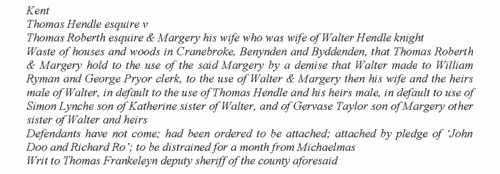
| Gloucestershire Entries in the Common Pleas (1558)
The Common Roll of the Common Pleas records litigation before the justices de Banco from throughout England.
MAYOWE. Cost: £8.00.  | Sample scan, click to enlarge
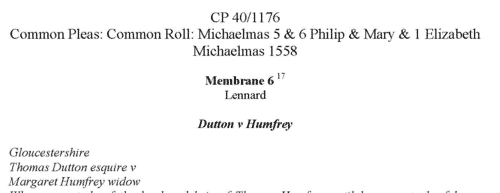
| Prerogative Court of Canterbury Wills: Cornwall: Strays
(1658)
William Brigg compiled abstracts of all the wills in Register "Wootton" of the Prerogative Court of Canterbury. The abstracts of those proved in 1658 were published by him in 1894. The court's main jurisdiction was central and southern England and Wales, as well as over sailors &c dying abroad. We have re-indexed the whole volume, county by county, for both testators and strays (legatees, witnesses and other persons mentioned in the abstracts). MAYOWE. Cost: £4.00.  | Sample scan, click to enlarge
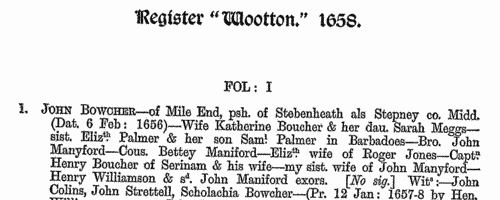
| Licences for marriages in southern England
(1632-1714)
The province or archbishopric of Canterbury covered all England and Wales except for the northern counties in the four dioceses of the archbishopric of York (York, Durham, Chester and Carlisle). Marriage licences were generally issued by the local dioceses, but above them was the jurisdiction of the archbishop. Where the prospective bride and groom were from different dioceses it would be expected that they obtain a licence from the archbishop; in practice, the archbishop residing at Lambeth, and the actual offices of the province being in London, which was itself split into myriad ecclesiastical jurisdictions, and spilled into adjoining dioceses, this facility was particularly resorted to by couples from London and the home counties, although there are quite a few entries referring to parties from further afield. Three calendars of licences issued by the Faculty Office of the archbishop were edited by George A Cokayne (Clarenceux King of Arms) and Edward Alexander Fry and printed as part of the Index Library by the British Record Society Ltd in 1905. The first calendar is from 14 October 1632 to 31 October 1695 (pp. 1 to 132); the second calendar (awkwardly called Calendar No. 1) runs from November 1695 to December 1706 (132-225); the third (Calendar No. 2) from January 1707 to December 1721, but was transcribed only to the death of queen Anne, 1 August 1714. The calendars give only the dates and the full names of both parties. Where the corresponding marriage allegations had been printed in abstract by colonel Joseph Lemuel Chester in volume xxiv of the Harleian Society (1886), an asterisk is put by the entry in this publication. The licences indicated an intention to marry, but not all licences resulted in a wedding. MAYOWE. Cost: £4.00.  | Sample scan, click to enlarge
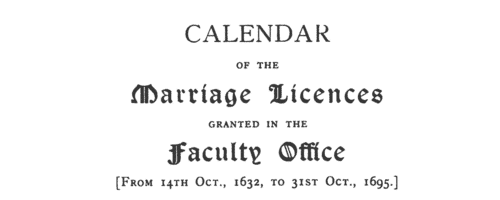
| Tradesmen of Lynn in Norfolk
(1292-1836)
Lists of admissions of freemen of Lynn from the earliest surviving records to 1836 were published by the Norfolk and Norwich Archaeological Society in 1913. These lists were extracted from the tallage rolls of 1291 to 1306; the Red Register of Lynn from 1342 to 1395; from the assembly rolls for the reigns of Henry IV and V [1399 to 1422]; from the hall books from 1423; and from a list of freemen starting in 1443 in the Book of Oaths (but itself abstracted from entries in the hall books). Freedom of the borough, necessary to practise a trade there, could be obtained by birth (in which case the father's name and occupation are usually given); by apprenticeship to a freeman (the master's name and occupation being given); by gratuity; or by purchase. Both the freemen and the masters listed are indexed here. The main abbreviations used are: B., freedom taken up by right of birth; A., freedom taken up by right of apprenticeship; G., freedom granted by order of assembly (gratuity); and P., freedom acquired by purchase.MAYOWE. Cost: £4.00.  | Sample scan, click to enlarge

|
Research your ancestry, family history, genealogy and one-name study by direct access to original records and archives indexed by surname.
|











